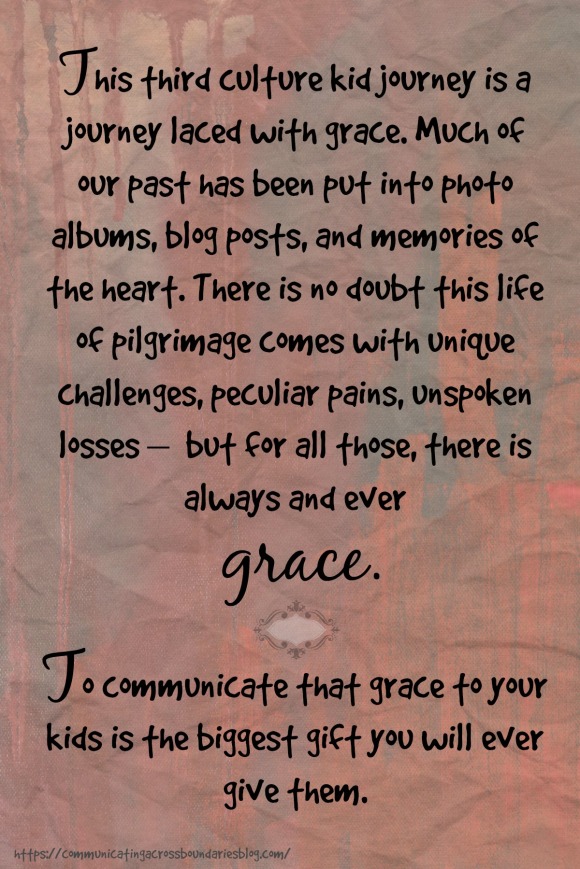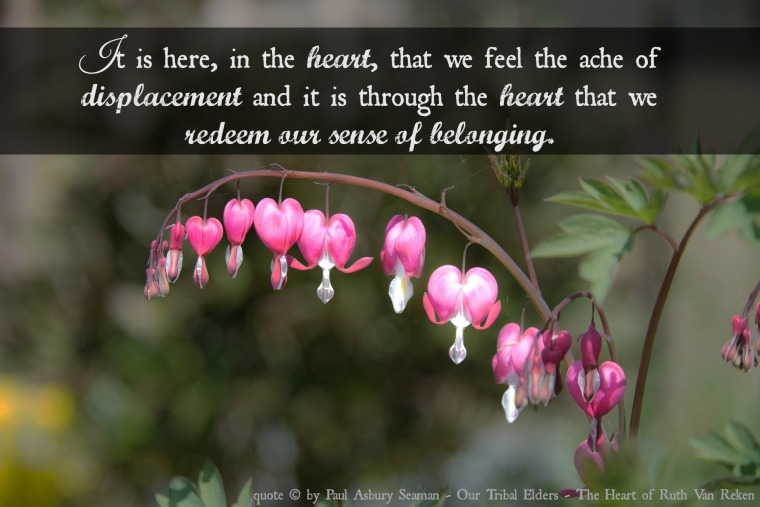
Readers – Third Culture Kids 3rd Edition Growing up Among Worlds came out yesterday! I couldn’t be happier about this new edition and the emphasis on today’s TCK that includes information on technology, cultural complexity, and more information for educators and those that work with TCKs. In honor of this new release I am reposting a piece that I wrote three years ago for A Life Overseas. Enjoy and take a look at the new edition of what we term the TCK “Bible”.
For as long as I can remember I have lived between worlds.
My first memories of life are from a rooftop in the southern area of Pakistan. The high, flat roof surrounded by walls was a perfect place to keep cool when the hot months came in early May. We slept on rope beds covered in mosquito netting able to feel an almost cool breeze after sundown.
Mosques surrounded our house on all four sides, their minarets stately and tall against the desert sky. While on the inside prayer times and Bibles sustained us, on the outside we were minorities in a Muslim world where the call to prayer echoed out over the city five times a day and ordered the lives of all those around us.
When you grow up between worlds the research on identity formation does not apply in quite the same way. Instead, you move back and forth as one whose identity is being forged and shaped between two, often conflicting, cultures. “A British child taking toddling steps on foreign soil or speaking his or her first words in Chinese with an amah (nanny) has no idea of what it means to be human yet, let alone “British.” He or she simply responds to what is happening in the moment” (Pollock and Van Reken, 2001).
There is now documented research that identifies some of the strengths and weaknesses that are part of growing up between worlds.
Here are some of the strengths that the third culture kid develops through living between worlds:
Cross-cultural skills
From their early years, third culture kids interact and enjoy ‘difference.’ They often take on various characteristics from the cultures where they have lived. They don’t see difference as good or bad – just different. This gives them a huge advantage in our global world. To be able to interact across cultural values and differences is a gift that is inherent to who they are.
Adaptability
Third culture kids show amazing ability to adapt across cultures. They are as comfortable in a crowded bazaar in a large city in Asia as they are in a pub in England. They blend with seeming ease into whatever setting they are thrown into – as long as it is outside their passport country!
Maturity
Often third culture kids are seen as more mature than their counterparts in their passport countries. They easily interact with adults two and three times their age and can see things from a more mature perspective.
Global view of the world
The worldview of the third culture kid is broad and wide. They often look around a room and think – “am I the only one who sees things this way?” People, governments, cultures, and countries all over the world have shaped them and it is impossible for them to have a one-dimensional worldview.
Flexibility
The third culture kid has learned how to be flexible and adjust their behavior to fit the situation. This flexibility can be a tremendous gift, particularly in rapidly changing situations.
Bridge-builders
Third culture kids are natural bridge builders. They are often able to see both sides of a situation and help to negotiate a successful outcome or interaction. This is an invaluable skill set and they often look for jobs that will allow them to function in this role.
With every strength comes a weakness and the successful third culture kid learns to recognize their weaknesses.
Some of those include:
Insecurity
There can be profound feelings of insecurity related to one’s passport culture. The sense of not belonging can come in unexpected places and spaces and result in precarious footing – like you’re on a cliff and one step in the wrong direction could send you hurtling into a place where you will get badly injured. Food, dress, cultural do’s and don’ts can all feel foreign, and with that cause a distrust of one’s ability to navigate
Unresolved grief and loss
Dave Pollock articulated the profound grief and loss piece of a third culture upbringing in this statement: “Most TCKs go through more grief experiences by the time they are 20 than monocultural individuals do in a lifetime.”There is so much more to say about this, but just know that this grief is real, the losses are real, and with real grief and loss comes the need for real healing.
Arrogance
Arrogance is often insecurity by another name. When the third culture kid feels ‘other’ they resort to coping mechanisms. This can come off as profound arrogance and result in exactly the opposite of what they really want – cause further alienation and feelings of being ‘other’ when what is longed for is connection and understanding.This can turn into a vicious cycle for the TCK and needs to be addressed for what it is – a deep insecurity with who they are within the context of their passport culture.
Difficulty planting roots
When your roots are everywhere, they can feel like they are nowhere. When the third culture kid tries to transition from a global background to a life of less movement it can be unsettling. As much as they may say they want roots, the tug of the airport, the feel of the airplane, the sense of hopeful expectation that comes from travel has been a part of their lives for as long as they can remember. Releasing this and exchanging it for roots is a huge step, and not one that is made easily.
While this is in no way an exhaustive list, it is a good start to recognizing strengths and weaknesses. When we name something, we have more power over it. When I name insecurity, I can address it for what it is. When I admit to grief and loss, I can begin to heal.
So how can you help your third culture kid as they live between worlds? The one you love more than life itself, the one who you’ve heard crying into the night, even as you face your own losses? Much has been written on this and there are some excellent resources available. But here are a couple of thoughts that have recently come up in conversation with other third culture kids.
Here is what helped me – perhaps it will help the kids you know who are living between worlds.
Name the losses
Naming the losses, identifying those things they long and grieve for legitimizes their grief. They no longer have to keep these feelings bottled up, dismissing them as unimportant. Naming their losses helps them face and deal with those losses. Naming them begins the important process of healing. Naming the losses can feel disloyal for a third culture kid, particularly if they have a good relationship with their parents. They don’t want to appear ungrateful or hurt their mom and dad. Because of this, it is often best done with a neutral person, one who will not feel hurt by this process.
Express feelings of restlessness
The third culture kid needs to be able to express their restlessness without parents or other loved ones becoming defensive and telling them how lucky they are to be where they are, to have the background they have had. The TCK experience is best captured by the word “Saudade”, a Portuguese word that has no English equivalent. It is an indolent wistfulness for what no longer exists. “Killing the Saudade” (Another Portuguese phrase) happens when they can get together with like-minded friends and express their restlessness, talk about home or the last place they lived, eat familiar foods, and reconnect with those from their past. Killing the saudade really works. It is an effective tool to address the restlessness and move forward in the places where we are planted.
Journal life events
Some of the fears of the third culture kid is that they will forget; that these places that hold such a big part of their heart and soul will be relegated to distant memories, and soon be gone. Journaling these events, even if they happened long ago, helps to remind the TCK of the gift of a global upbringing. Journaling can help the TCK process thoughts and memories.
Tell their story
As parents, it is easy for us to want to tell the story – but our kids have a story as well, and it is vital that they learn to tell it, that they own their story. If we are the ones hijacking the story, they never learn to take hold of it as their own. Part of their story is connecting their multicultural past to a meaningful present. We can’t do it for them, but we can encourage them along the way, encourage them to develop their own voices, separate from those of parents and siblings, remind them of who they are through their story. When they learn to tell their stories, they are better able to hear the stories of others, to recognize that everyone has a story.
It is these things that have led me to tell my own story, to write, to reflect, to describe – “my memory may be biased, or relayed in a way that my mom would say ‘that’s not quite the way it happened,’ but it is inalienably mine.”*
“In Exodus God repeatedly tells the people of Israel to remember their story, to remember their beginning, to remember who they are. Later, exiled in Babylon, unable to return home, they were to remember their stories – stories of wonder and deliverance, of the power of God and His provision. They were to remember their beginnings.” from Between Worlds: Essays on Culture and Belonging, July 1st, 2014 Doorlight Publications.
Books on Third Culture Kids:
- Third Culture Kids 3rd Edition Growing Up Among Worlds “Growing up as a TCK has been a gift and has significantly shaped my life and work. As I interact with world leaders one day and with those living in refugee camps the next, I continually draw upon my experience of living among different cultures. I am delighted to see the lessons learned from the traditional TCK experience live on in this new edition of ‘Third Culture Kids’.”―Scott Gration, Maj Gen, USAF (Ret), President Obama’s Special Envoy to Sudan
- Between Worlds: Essays on Culture and Belonging. The book is a set of essays on living between and is divided into 7 sections: Home, Identity, Belonging, Airports, Grief & Loss, Culture Clash, and Goodbyes set the stage for individual essays within each section.
- Worlds Apart: A Third Culture Kid’s Journey. A personal journey on Pakistan, belonging, and faith that may resonate with others who have lived between.
My prayer is that somehow, by the grace of God, these books will resonate with others who are living a life between worlds, so that others can remember their story and know it was worth it.
*From Kebabs in Jalalabad in Between Worlds – Essays on Culture and Belonging

 Now Available and on sale today! Worlds Apart: A Third Culture Kid’s Journey “…a must read for those wanting to build bridges.” Ambassador Akbar Ahmed, American University, Washington, D.C.
Now Available and on sale today! Worlds Apart: A Third Culture Kid’s Journey “…a must read for those wanting to build bridges.” Ambassador Akbar Ahmed, American University, Washington, D.C. 





